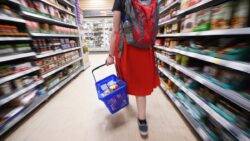Coffee and chocolate help drive supermarket prices higher
In the year leading up to May, the rate of price increases at supermarkets in the UK reached a new peak, primarily driven by rising costs of coffee, chocolate, and non-food items.
According to the British Retail Consortium (BRC) and NielsenIQ, inflation in grocery stores reached 9% overall. While prices for fresh food experienced a slight decline, the costs of commodities like coffee and cocoa witnessed significant jumps.
Discussions are underway within the government regarding the possibility of requesting supermarkets to impose price caps on food items to tackle the rising cost of living.
However, the BRC has dismissed the idea of price caps, suggesting that the government should instead focus on reducing bureaucratic regulations so that resources can be allocated to maintaining low prices, rather than resorting to “price controls reminiscent of the 1970s.”
The BRC and NielsenIQ data, covering the week from May 1st to May 6th, reveal that food inflation slightly decreased from 15.7% in the year leading up to April to 15.4%. Nevertheless, this figure remains the second-highest rate of food inflation ever recorded. A decline in the rate of price increases does not signify a decrease in food costs but rather indicates a slower pace of increase.
In contrast, the rate of price hikes for non-food goods rose from 5.5% in the year leading up to April to 5.8% in May.
There was a moderation in the price growth of fresh produce, with an increase of 17.2% in May compared to 17.8% previously.
Price inflation for ambient foods, which includes goods that can be stored at room temperature, rose to the fastest pace ever recorded at 13.1% in the year leading up to May, up from 12.9%.
Recent official figures indicated a significant decrease in the headline inflation rate to 8.7% in April, marking the first time it fell below 10% since August.





